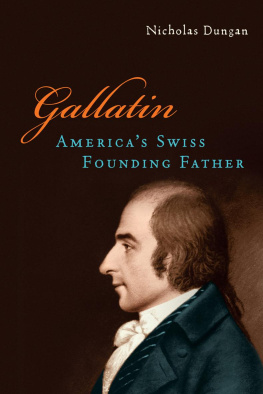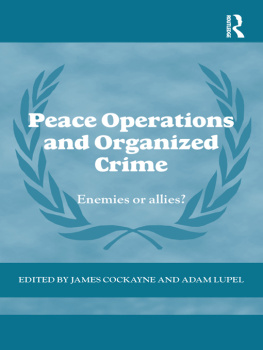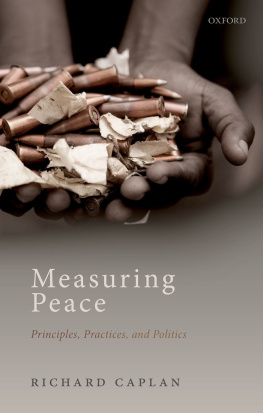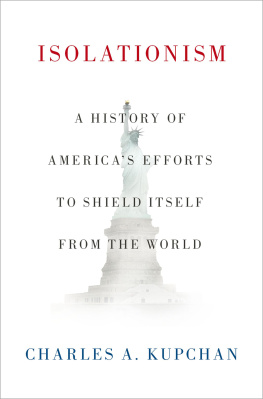Kupchan - How Enemies Become Friends: The Sources of Stable Peace
Here you can read online Kupchan - How Enemies Become Friends: The Sources of Stable Peace full text of the book (entire story) in english for free. Download pdf and epub, get meaning, cover and reviews about this ebook. City: Princeton University Press, publisher: Princeton University Press, genre: Politics. Description of the work, (preface) as well as reviews are available. Best literature library LitArk.com created for fans of good reading and offers a wide selection of genres:
Romance novel
Science fiction
Adventure
Detective
Science
History
Home and family
Prose
Art
Politics
Computer
Non-fiction
Religion
Business
Children
Humor
Choose a favorite category and find really read worthwhile books. Enjoy immersion in the world of imagination, feel the emotions of the characters or learn something new for yourself, make an fascinating discovery.

How Enemies Become Friends: The Sources of Stable Peace: summary, description and annotation
We offer to read an annotation, description, summary or preface (depends on what the author of the book "How Enemies Become Friends: The Sources of Stable Peace" wrote himself). If you haven't found the necessary information about the book — write in the comments, we will try to find it.
Kupchan: author's other books
Who wrote How Enemies Become Friends: The Sources of Stable Peace? Find out the surname, the name of the author of the book and a list of all author's works by series.
How Enemies Become Friends: The Sources of Stable Peace — read online for free the complete book (whole text) full work
Below is the text of the book, divided by pages. System saving the place of the last page read, allows you to conveniently read the book "How Enemies Become Friends: The Sources of Stable Peace" online for free, without having to search again every time where you left off. Put a bookmark, and you can go to the page where you finished reading at any time.
Font size:
Interval:
Bookmark:
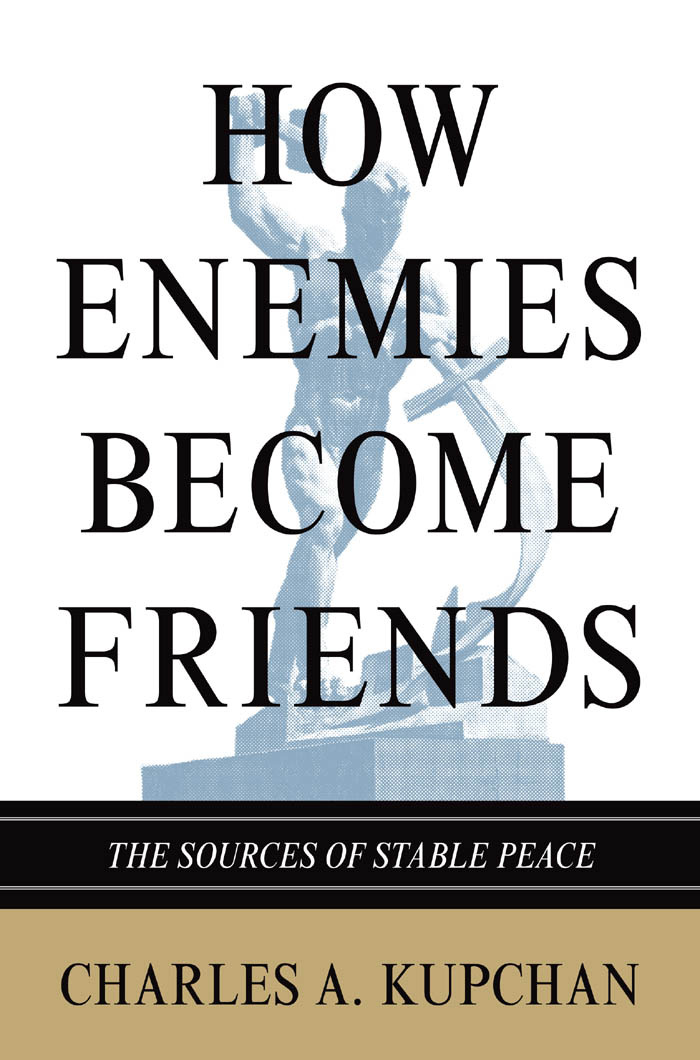
HOW
ENEMIES
BECOME
FRIENDS
PRINCETON STUDIES IN INTERNATIONAL HISTORY AND POLITICS
G. John Ikenberry and Marc Trachtenberg, SERIES EDITORS
Recent Titles

How Enemies Become Friends: The Sources of Stable Peace by Charles A. Kupchan
1989: The Struggle to Create PostCold War Europe by Mary Elise Sarotte
The Struggle for Power in Early Modern Europe: Religious Conflict, Dynastic Empires, and International Change by Daniel H. Nexon
Strong Borders, Secure Nation: Cooperation and Conflict in Chinas Territorial Disputes by M. Taylor Fravel
The Sino-Soviet Split: Cold War in the Communist World by Lorenz M. Lthi
Nuclear Logics: Contrasting Paths in East Asia and the Middle East by Etel Solingen
Social States: China in International Institutions, 19802000 by Alastair Iain Johnston
Appeasing Bankers: Financial Caution on the Road to War by Jonathan Kirshner
The Politics of Secularism in International Relations by Elizabeth Shakman Hurd
Unanswered Threats: Political Constraints on the Balance of Power by Randall L. Schweller
Producing Security: Multinational Corporations, Globalization, and the Changing Calculus of Conflict by Stephen G. Brooks
Driving the Soviets up the Wall: SovietEast German Relations, 19531961 by Hope M. Harrison
Legitimacy and Power Politics: The American and French Revolutions in International Political Culture by Mlada Bukovansky
Rhetoric and Reality in Air Warfare: The Evolution of British and American Ideas about Strategic Bombing, 19141945 by Tami Davis Biddle
Revolutions in Sovereignty: How Ideas Shaped Modern International Relations by Daniel Philpott
ENEMIES
BECOME
FRIENDS

THE SOURCES OF STABLE PEACE

Charles A. Kupchan
A Council on Foreign Relations Book
PRINCETON UNIVERSITY PRESS
PRINCETON AND OXFORD
Copyright 2010 by Princeton University Press
Published by Princeton University Press, 41 William Street, Princeton, New Jersey 08540
In the United Kingdom: Princeton University Press, 6 Oxford Street, Woodstock,
Oxfordshire OX20 1TW
All Rights Reserved
Library of Congress Cataloging-in-Publication Data
Kupchan, Charles.
How enemies become friends : the sources of stable peace / Charles A. Kupchan.
p. cm. (Princeton studies in international history and politics) (Council on foreign relations book)
Includes bibliographical references and index.
ISBN 978-0-691-14265-4 (hardcover : alk. paper) 1. Peaceful change (International relations)
2. Peace-building. 3. International relations21st century. 4. World politics21st century.
5. National security. 6. Balance of power. I. Title.
JZ5538.K87 2010
303.66dc22
2009024769
British Library Cataloging-in-Publication Data is available
The Council on Foreign Relations (CFR) is an independent, nonpartisan membership organization, think tank, and publisher dedicated to being a resource for its members, government officials, business executives, journalists, educators and students, civic and religious leaders, and other interested citizens in order to help them better understand the world and the foreign policy choices facing the United States and other countries. Founded in 1921, CFR carries out its mission by maintaining a diverse membership, with special programs to promote interest and develop expertise in the next generation of foreign policy leaders; convening meetings at its headquarters in New York and in Washington, DC, and other cities where senior government officials, members of Congress, global leaders, and prominent thinkers come together with CFR members to discuss and debate major international issues; supporting a Studies Program that fosters independent research, enabling CFR scholars to produce articles, reports, and books and hold roundtables that analyze foreign policy issues and make concrete policy recommendations; publishing Foreign Affairs, the preeminent journal on international affairs and U.S. foreign policy; sponsoring Independent Task Forces that produce reports with both findings and policy prescriptions on the most important foreign policy topics; and providing up-to-date information and analysis about world events and American foreign policy on its website, www.cfr.org.
The Council on Foreign Relations takes no institutional position on policy issues and has no affiliation with the U.S. government. All statements of fact and expressions of opinion contained in its publications are the sole responsibility of the author or authors.
This book has been composed in Times New Roman
Printed on acid-free paper.
press.princeton.edu
Printed in the United States of America
1 3 5 7 9 10 8 6 4 2
For Nicholas and his generation
May they know only peace
FIGURES
MAPS
TABLE
I began to ponder the central themes of this book about a decade ago, prompted by two emerging trends. The first was the ongoing diffusion of power in the international system. This development begged the question of whether the transition from a unipolar to a multipolar world could occur peacefully. The second was the growing divide between the United States and Europe, a rift that became apparent during the late 1990s and was then brought to a head by the U.S.-led invasion of Iraq in 2003. The resulting acrimony opened the possibility that the political community forged by the Atlantic democracies during the second half of the twentieth century might falter and again fall prey to geopolitical rivalry.
I began to address these changes in international politics in my last two books. In 2001, my co-authors and I published Power in Transition: The Peaceful Change of International Order, a volume that explicitly addressed how to manage shifts in global power. I am indebted to my collaborators: Emanuel Adler, Jean-Marc Coicaud, and Yuen Foong Kong. Jason Davidson and Mira Sucharov contributed a chapter, as well as valuable research assistance. United Nations University published the book and provided financial support. I continued my exploration of global change in The End of the American Era: U.S. Foreign Policy and the Geopolitics of the Twenty-first Century (Knopf, 2002). This book focused on the changing nature of American internationalism and transatlantic relations, the waning of U.S. primacy, and the onset of a multipolar world.
Both of these volumes helped lay the intellectual foundations for this book. Exploring how and when states are able to manage change peacefully and escape the dictates of geopolitical rivalry led me to the question, at once simple and profound, that is at the core of this work: How do enemies become friends?
My two home institutions, Georgetown University and the Council on Foreign Relations, provided ideal settings for exploring this question. My colleagues and students at Georgetown offered a vibrant community in which to try out new ideas and explore the historical cases. Robert Gallucci, the former dean of the School of Foreign Service, provided consistent encouragement as well as generous research support. My colleagues at the Council on Foreign Relations were similarly helpful and stimulating, offering a venue for testing my analysis and conclusions within the policy community. I am indebted to Council on Foreign Relations president, Richard N. Haass, for his personal and institutional support, and for the thoughtful comments he provided on the draft manuscript.
Font size:
Interval:
Bookmark:
Similar books «How Enemies Become Friends: The Sources of Stable Peace»
Look at similar books to How Enemies Become Friends: The Sources of Stable Peace. We have selected literature similar in name and meaning in the hope of providing readers with more options to find new, interesting, not yet read works.
Discussion, reviews of the book How Enemies Become Friends: The Sources of Stable Peace and just readers' own opinions. Leave your comments, write what you think about the work, its meaning or the main characters. Specify what exactly you liked and what you didn't like, and why you think so.


